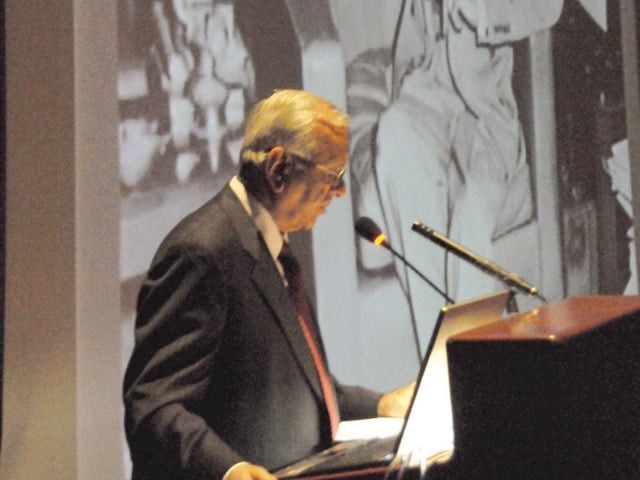Looking forward: Grand nephew struggles to answer why Muhammad Ali Jinnah is relevant today
Liaquat Merchant gives lecture on Pakistan's founder at AKU.

A large crowd of mostly senior citizens but also students, faculty and journalists, had gathered to hear Merchant speak. Rida Turabi, who helped promote the event, said the lecture was part of a series of talks on issues relevant to Pakistani society.
Merchant is the president of the Jinnah Society and the founder and managing trustee of the Jinnah Foundation. Due to his family links, Merchant possessed a wealth of information on Jinnah’s life, his family and his estate.
“We ought to develop leadership on the values of private honour and public integrity, according to the precedent set by Jinnah,” he said. In an attempt to show the audience the impact of Jinnah’s personality on other leaders, Merchant read out a series of tributes to Jinnah collected by the Jinnah Society. Sir Sultan Mohammad Shah, Aga Khan III, former US President Harry S Truman, Akbar A Ahmed and Lieutenant General (retd) Sahabzada Yaqub Khan were among those who praised Jinnah’s “incorruptible” nature.
Merchant also tried to clear up lingering confusions about Jinnah’s actual birthplace. When an audience member said he had heard Jinnah was actually born in Jhirk, a town in Sindh, Merchant admitted that this could be possible, but added: “The most important thing is that he was born in this part of the world and that he was a leader”.
“He seems like a nice man,” whispered an audience member during the speech. “But I don’t see how this discussion relates to the topic at all.”
Much of Merchant’s presentation was, however, spent highlighting Jinnah’s ideology and personal achievements rather than analysing the great man’s relevance in today’s world.
Issues such as education and Pakistan’s current-day political stability were only addressed in the question-and-answer session that followed the lecture. It was at this point that Merchant allowed that “had Jinnah concentrated solely on creating an appropriate Constitution before his death, we might have been in a better place.”
In response to a question about Pakistan’s educational system, Merchant said the education board should introduce a subject that teaches children about Jinnah’s ideals and values, so that he may serve as a more accessible role model.
The affection that Pakistanis still feel for their founding father was evident in the abundant applause that followed the mention of each of Jinnah’s achievements. The question of his significance today can be judged by the fact that when a faculty member leaned into the microphone at the end of the lecture to ask: “How many of you think Jinnah is relevant today?” Only half the audience members raised their hands.
Published in The Express Tribune, January 21st, 2011.



















COMMENTS
Comments are moderated and generally will be posted if they are on-topic and not abusive.
For more information, please see our Comments FAQ